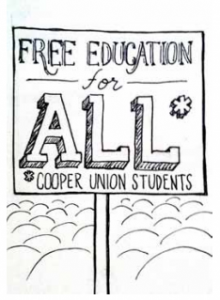During Cooper Union’s protest held in December, a large red sign hung down the side of the Cooper Union Foundation Building, reading “Free Education To All.” The implications of this message are powerful and exciting, especially to college students paying $40,000 a year. However, aren’t these students protesting for the continuation of free education at Cooper Union and not, in fact, for the rest of the world?
It is true that Cooper Students, like students from any college, would love to have a system of free universal education. But although the mere idea of universal education is exciting, the actual possibility of it happening is slim to nonexistent. It’s not something that can be accomplished through any number of protests. So are Cooper students really protesting for “Free Education To All,” or are they simply protesting for free education at Cooper Union?
CBS quoted the Cooper senior, Rachel Appel, in their article on the protest — “We’re fighting for free education here, but we’re also fighting against the rising tuition costs nationwide and the student debt nationwide.”
The WNYC News Blog quoted the fifth year Cooper protester, Jake Lee — “Universal accessibility to free education is the only way that a democracy can function.”
On a rally flyer from December, Cooper Architecture Professor David Gersten wrote, “We have the opportunity to clarify, galvanize and push forward a movement that recognizes free education as a human right to all people.”

These Cooper students and faculty may feel that they are fighting for students across the nation/world, however, their actual demands stick solely to their own college. In the demand letter published by protesters, they wrote:
Our demands are as follows:
1. The administration must publicly affirm the college’s commitment to free education. They will stop pursuing new tuition-based educational programs and eliminate other ways in which students are charged for education.
2. The Board of Trustees must immediately implement structural changes with the goal of creating open flows of information and democratic decision-making structures. The administration’s gross mismanagement of the school cannot be reversed within the same systems which allowed the crisis to occur. To this end, we have outlined actions that the board must take:
-
Record board meetings and make minutes publicly available.
-
Appoint a student and faculty member from each school as voting members of the board.
-
Implement a process by which board members may be removed through a vote from the Cooper Union community, comprised of students, faculty, alumni, and administrators.
3. President Bharucha steps down.
These demands do not include anything about “Free Education To All;” they are focused exclusively on the problems concerning Cooper Union.
Cooper students may believe that by fighting for free education at Cooper Union they are setting a model for “Free Education To all,” but it’s truly free education for Cooper. Cooper Union is able to have free education because of its unusually large endowments and donations — a method that cannot be considered a model for universal education.
Now, don’t get me wrong: I completely support Cooper Union’s system of free education and I encourage the students to continue protesting for this cause. However, I find it misleading for the Cooper Union protesters to march under the banner of “Free Education To All” when that is not what they’re actually fighting for. For a more effective and honest demonstration, students should stick to their “Free Education for Cooper Students” slogan, so as not to get students from other schools, like me, too excited.







Leave a Reply